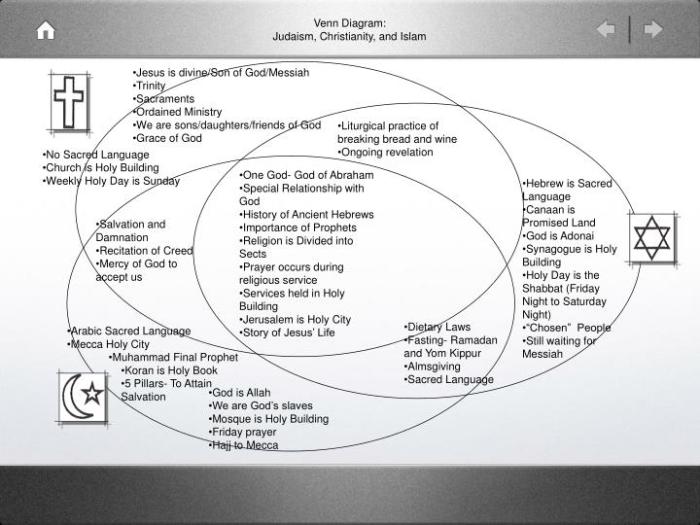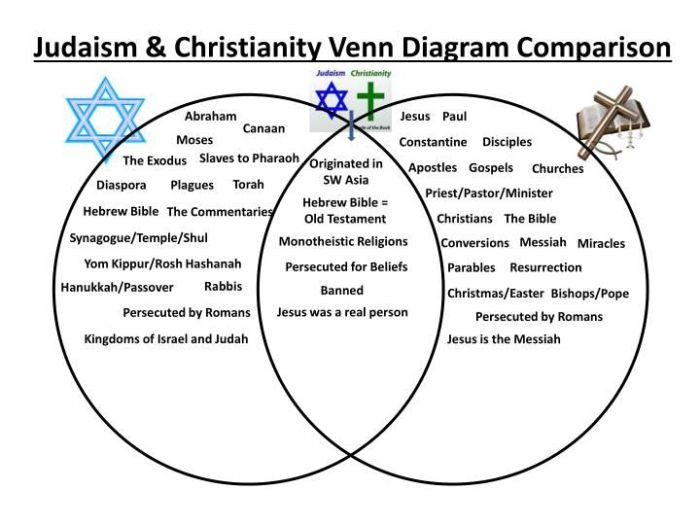The Venn diagram of Christianity and Judaism presents a compelling exploration of the historical connections, shared beliefs, theological differences, cultural impact, and interfaith dialogue between these two influential religions. This intricate tapestry of shared origins and divergent paths offers a profound understanding of the shaping forces that have influenced their development and societal impact.
Christianity and Judaism share a rich historical legacy, with roots in the ancient traditions of the Middle East. The timeline of key events that shaped their relationship, including the Roman Empire’s influence, provides a framework for understanding the evolution of their beliefs and practices.
Historical Connections
Christianity and Judaism share deep historical roots, dating back to the ancient Near East. Both religions originated in the land of Israel, with Judaism emerging as the religion of the Israelites around the 13th century BCE. Christianity emerged as a sect within Judaism in the 1st century CE, founded by Jesus Christ.
Timeline of Key Events
- c. 13th century BCE: Emergence of Judaism as the religion of the Israelites
- c. 6th century BCE: Babylonian exile of the Jews
- c. 539 BCE: Return of the Jews from exile and rebuilding of the Second Temple
- c. 1st century CE: Birth of Jesus Christ
- c. 30 CE: Crucifixion and resurrection of Jesus Christ
- c. 70 CE: Roman destruction of the Second Temple
Impact of the Roman Empire
The Roman Empire played a significant role in shaping the relationship between Christianity and Judaism. The Romans tolerated Judaism as a religion but persecuted Christians as a threat to their authority. This persecution led to the spread of Christianity throughout the Roman Empire, as Christians fled persecution and sought refuge in other regions.
Shared Beliefs: Venn Diagram Of Christianity And Judaism

Christianity and Judaism share a number of core beliefs, including the belief in one God, the importance of moral conduct, and the hope for a future redemption.
Core Beliefs
- Monotheism: Belief in one God
- Moral conduct: Emphasis on ethical behavior and social justice
- Eschatology: Belief in a future redemption or end of time
Influence on Development
These shared beliefs have had a profound influence on the development of both Christianity and Judaism. They have shaped the ethical teachings, religious practices, and spiritual traditions of both religions.
Significance of the Old Testament
The Old Testament, which is the Hebrew Bible, is a shared sacred text for both Christianity and Judaism. It contains the history, laws, and teachings of the ancient Israelites and serves as a foundation for the beliefs and practices of both religions.
Theological Differences

Despite their shared historical roots and core beliefs, Christianity and Judaism have developed distinct theological differences.
Key Differences
- Nature of Jesus Christ: Christians believe Jesus is the Son of God and the Messiah, while Jews do not
- Trinity: Christians believe in the Trinity (God the Father, God the Son, and God the Holy Spirit), while Jews believe in one God
- Salvation: Christians believe salvation is achieved through faith in Jesus Christ, while Jews believe salvation is achieved through adherence to the Torah (Jewish law)
Impact on Practices and Rituals
These theological differences have shaped the practices and rituals of each religion. For example, Christians celebrate the Eucharist as a sacrament commemorating the Last Supper, while Jews observe Passover as a remembrance of the Exodus from Egypt.
Role of Jesus Christ
The role of Jesus Christ is a central theological difference between Christianity and Judaism. Christians believe Jesus is the Son of God and the Messiah who came to redeem humanity from sin. Jews, on the other hand, do not believe Jesus is the Messiah and reject the idea of a divine savior.
Cultural and Societal Impact
Christianity and Judaism have had a profound impact on the cultural and societal development of Western civilization.
Influence on Art, Literature, and Music
- Art: Christian and Jewish themes have inspired countless works of art, from paintings to sculptures to architecture
- Literature: The Bible has been a major source of inspiration for Western literature, influencing works from Shakespeare to Milton
- Music: Christian and Jewish music have influenced the development of Western music, from Gregorian chant to classical symphonies
Role in Social and Political Structures
Religion has played a significant role in shaping social and political structures throughout history. Christianity and Judaism have both influenced the development of laws, social norms, and political institutions.
Interfaith Dialogue

Interfaith dialogue between Christianity and Judaism is essential for promoting understanding and cooperation between the two religions.
Importance of Dialogue, Venn diagram of christianity and judaism
Interfaith dialogue allows for the exchange of ideas, the exploration of common ground, and the building of bridges between different religious communities.
Successful Initiatives
- The World Council of Churches and the International Jewish Committee for Interreligious Consultations have been instrumental in promoting interfaith dialogue
- The Nostra Aetate declaration of the Second Vatican Council (1965) marked a significant step forward in Catholic-Jewish relations
Challenges and Opportunities
Interfaith dialogue is not without its challenges, such as historical tensions and theological differences. However, it is an essential endeavor for fostering peace and understanding between different religious communities.
User Queries
What is the significance of the Old Testament in both Christianity and Judaism?
The Old Testament serves as the foundation for both Christianity and Judaism, providing a shared narrative and moral framework. It contains the laws, prophecies, and historical accounts that have shaped the beliefs and practices of both religions.
How has the role of Jesus Christ influenced Christian theology?
Jesus Christ is central to Christian theology, seen as the Messiah and Son of God. His life, teachings, and resurrection are foundational to Christian beliefs about salvation, grace, and the nature of God.
What are the key theological differences between Christianity and Judaism?
Christianity and Judaism differ in their beliefs about the nature of God, the role of Jesus Christ, and the path to salvation. These differences have shaped the practices and rituals of each religion, including the sacraments in Christianity and the observance of Jewish law.
